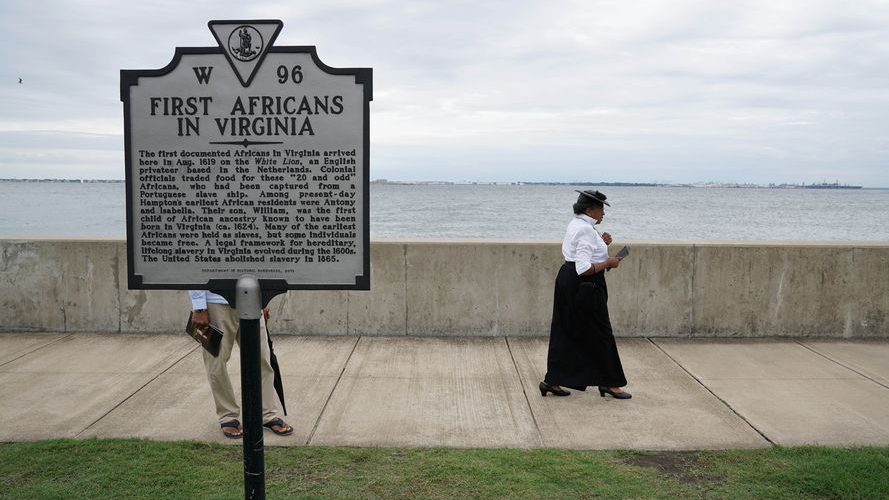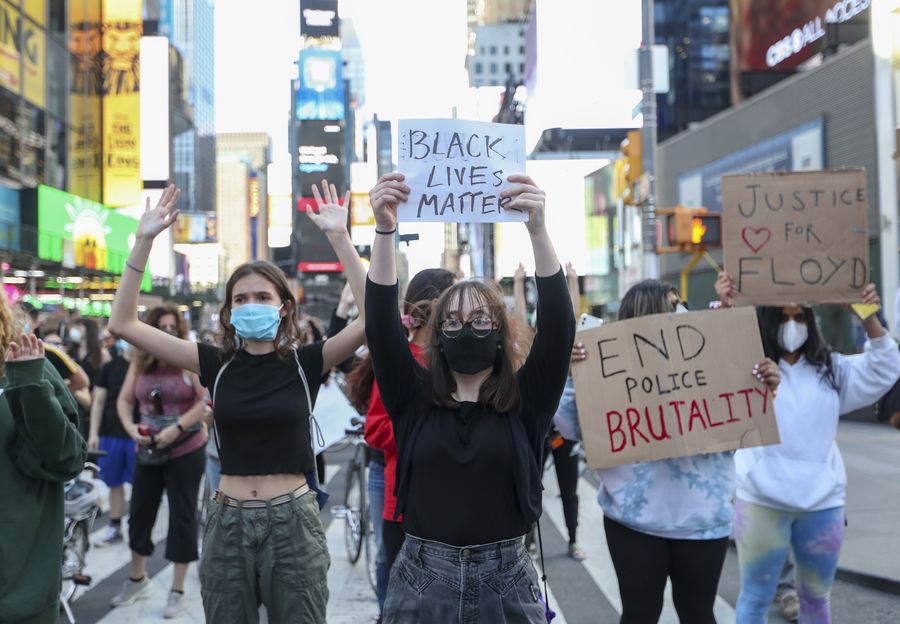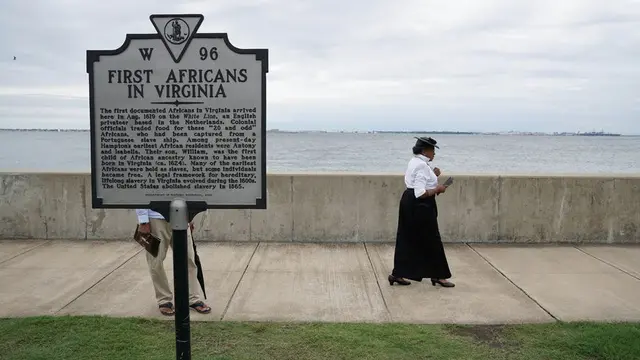
A woman passes the First Africans in Virginia sign at Fort Monroe in Hampton, Virginia, U.S., August 24, 2019. /Xinhua
**Editor's note: **Iram Khan is a Pakistan-based commentator on international affairs. The article reflects the author's opinions, and not necessarily the views of CGTN.
The killing of George Floyd at the hands of police officers in the U.S. city of Minneapolis has generated a discussion that remained obscured throughout the last century. Though the outcry has mainly focused on racism, people have started to talk about how colonialism sowed the roots of this menace.
During that oppressive period, the myriad industries of the West needed two important and supposedly expendable resources: materials and manpower. To quench this thirst, capitalists set out capturing far off and un-industrialized lands.
Slave trade, the most heinous aspect of that exploitative era, resurfaced atrociously after having been ceased since medieval times. As it fueled the factories and farms of the white world, it also changed its demographics. And today we have multi-ethnic societies where black communities are still finding themselves significantly disadvantaged.
The events following Floyd's death have blown some dust off of collective amnesia about a period and its effects that might be nuanced, yet are a reality of the present day. The renewed focus on inequality and discrimination among races has forced the intelligentsia to take cognizance of a problem that is a daily struggle for those at its receiving end, rather than a ghost of the past.
But how did this concern gather such great attention within the span of weeks? Enter the COVID-19 health crisis. Due to an initial inaction by President Donald Trump, the U.S. is presently one of the worst-hit countries by the pandemic. Its economy is in a recession, jobless claims are the highest ever and people have nothing to do but contemplate on how they ended up in this situation.
Had the killing of Floyd happened at any other time, there would have been some raised voices, ultimately getting lost into mundane life. But the U.S. government's botched response to COVID-19 has pushed the most vulnerable sections of American society – primarily the black population – to a predicament that they want to come out of and fix blame.
The result, in addition to protests demanding equality, has been a campaign against chapters of history that put black and indigenous masses in a disadvantageous position in the first place.
Statues of U.S. Confederates have been toppled and people have gone on to dismount those of the 15th century explorer Christopher Columbus, who is accused of murdering millions of native Americans on his arrival.

Demonstrators protest against police brutality in Times Square in Manhattan, New York, U.S., May 31, 2020. /Xinhua
Across the Atlantic, British protesters have tipped the statue of a famous slaver, Edward Colston, into the dock and are clamoring to remove one of Cecil Rhodes whose colonizing outreach led to an extremely inhuman apartheid in South Africa.
While there have been previous attempts at correcting the mistakes of historical figures in the U.S., it is a first that a forceful drive is questioning the UK's role in the slave trade.
Activists have even demanded to revisit the legacy of former British Prime Minister Winston Churchill while recalling his actions that ignored a serious famine in Bengal, then part of the British empire, only to keep his soldiers well fed. More disturbingly, however, he considered his race "high-grade" that had done no wrong to the "Red Indians of America or the black people of Australia."
Unlike these colonized regions, Western Europeans had inhabited a land that largely remained arable throughout the year, with flat, navigable rivers and no real deserts.
They made the most of this natural advantage and, in the absence of a preoccupation with food security, became first to industrialize, conduct industrial-scale war and subjugate other parts of the world. In essence, Western Europe – and most successfully the UK – has been the architect of mass-scale human subservience.
It is a pity that the modern-day wealth of former imperial powers is built on colonialism and slavery. We see an economic divide between countries on racial lines as Europe and the U.S. are far more prosperous than Asia, Africa or South America.
The opportunity to prosper robbed from the latter has left millions under poor living standards. And when they immigrate to the developed nations in hopes of better lives, they are faced with pervasive discrimination.
The conversation around colonialism and slavery-originated racism is all the more necessary because leaders like Trump are still unapologetic. Against recent calls, he has rejected dropping Confederate names from U.S. military bases. This is definitely not the mindset of a single person, for he is an elected president representing a fairly large school of American thought.
The killing of George Floyd and the subsequent downing of statues has accentuated an issue that has not been debated since long. Partly, because it shakes the foundation of the progress and pride of today's developed nations.
Things did not change for a long time, and with recent events, they are fortunately headed toward the positive. On one hand, the reckoning will mitigate difficulties for a distressed multitude, while on the other, it will discourage the imposition of patronizing ideas onto others.
(If you want to contribute and have specific expertise, please contact us at [email protected].)
 简体中文
简体中文





